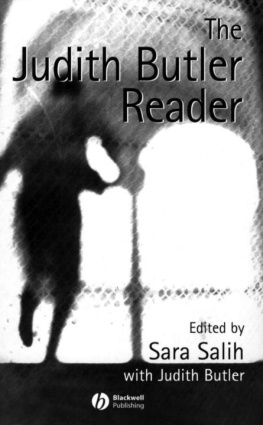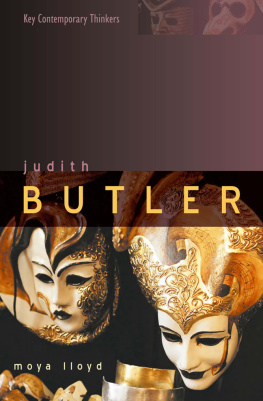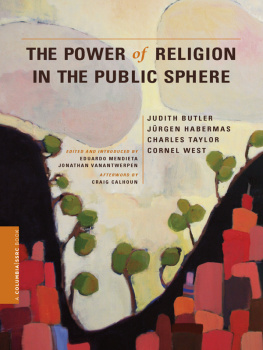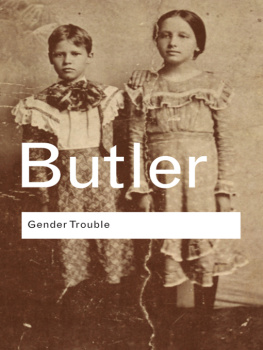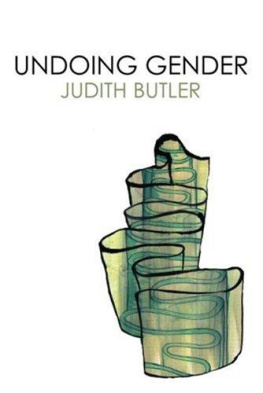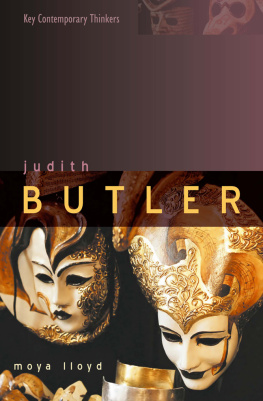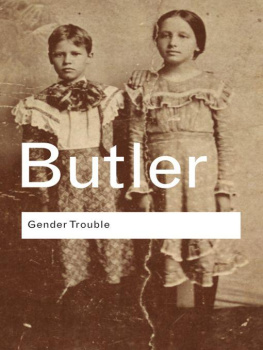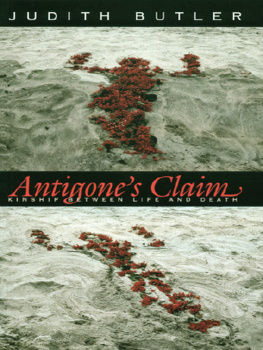




vii
The editor and publisher gratefully acknowledge the permission granted to reproduce the copyright material in this book:
I Judith Butler, "Variations on Sex and Gender: Beauvoir, Wittig, Foucault," pp. 128-42 and 185 (notes) from Seyla Benhabib and 1)rucilla Cornell (eds.), Feminism as Critique: Essays on the Politics of Gender in Late Capitalist Societies. Oxford: Polity Press, 1987. Reprinted by permission of Blackwell Publishing Ltd/Polity Press.
2 Judith Butler, preface to 1999 edition, pp. vii-xvii, and chapter 1, "Desire, Rhetoric and Recognition in Hegel's Phenomenology of Spirit," pp. 17-59, 240-4 (notes), from Subjects of Desire: Hegelian Reflections in Twentieth-Century France (originally published 1987; reprinted in paperback 1999 by Columbia University Press, New York). Reprinted by permission of Columbia University Press.
3 Judith Butler, preface to 1999 anniversary edition, pp. xiv-xxvi, 191-3 (notes), and chapter 3, "Subversive Bodily Acts," pp. 163-80, 215-16 (notes), from Gender Trouble: Feminismn and the Subversion of Identity (originally published 1990; reprinted 1999 by Routledge, New York). Reproduced by permission of Routledge, an imprint of Taylor & Francis Books, Inc.
4 Judith Butler, "Imitation and Gender Insubordination," pp. 13-31 from Diana Fuss (ed.), Inside Out: Lesbian Theories, Gay "Theories. New York: Routledge, 1991. Reproduced by permission of Routledge, an imprint of Taylor & Francis Books, Inc.
5 Judith Butler, chapter 2, "The Lesbian Phallus and the Morphological Imaginary," pp. 57-91, 257-65 (notes) from Bodies That Matter: On the Discursive Limits of "Sex. " New York: Routledge, 1993. Reproduced by permission of Routlcdge, an imprint of Taylor & Francis Books, Inc.
6 Judith Butler, "The Force of Fantasy: Mapplethorpe, Feminism, and Discursive Excess," pp. 105-25 from differences: A Journal of Feminist Cultural Studies 2:2 (1990). Bloomington: Indiana University Press. 1990 by Indiana University Press. All rights reserved. Used by permission of the publisher.
7 Judith Butler, "Endangered/Endangering: Schematic Racism and White Paranoia," pp. 15-22 from Robert Gooding-Williams (ed.), Reading Rodney King/Reading Urban Uprising. New York: Routledge, 1993. Reproduced by permission of Routledge, an imprint of Taylor & Francis Books, Inc.
8 Judith Butler, chapter 1, "Burning Acts, Injurious Speech," pp. 43-69, 169-73 (notes) from Excitable Speech: A Politics of the Performative. New York: Routledge, 1997. Reproduced by permission of Routledge, an imprint of Taylor & Francis Books, Inc.
9 Judith Butler, chapter 5, "Melancholy Gender/Refused Identification," pp. 132-50, 211-12 (notes) from The Psychic Life of Power: Theories in Subjection. Stanford: Stanford University Press, 1997. Originally published in Psychoanalytic Dialogues 5:5.2 (1995), pp. 165-94. Reprinted by permission of the Analytic Press as copyright holder and publisher.
10 Judith Butler, extracts from "Competing Universalities," pp. 143-8, 151-8, 159-62, 175-81 in Judith Butler, Ernesto Laclau, Slavoj 2iiek, Contingency, Hegemony, Universality: Contemporary Dialogues on the Left. London: Verso, 2000. Reprinted by permission of Verso.
11 Judith Butler, chapter 3, "Promiscuous Obedience," pp. 57-82, 92-7 from Antigone's Claim: Kinship Between Life and Death. New York: Columbia University Press, 2000. Reprinted by permission of Columbia University Press.
12 Judith Butler, "What Is Critique? An Essay on Foucault's Virtue," pp. 212-26 from David Ingram (ed.), The Political. Oxford: Blackwell, 2001. Reprinted by permission of Blackwell Publishing Ltd.
13 Judith Butler, interview with Gary A. Olson and Lynn Worsham, "Changing the Subject: Judith Butler's Politics of Radical Resignification," pp. 731-65 from Jac 20:4 (2000). Reprinted by permission of Lynn Worsham and Gary A. Olson.
Every effort has been made to trace copyright holders and to obtain their permission for the use of copyright material. The publisher apologizes for any errors or omissions in the above list and would be grateful if notified of any corrections that should be incorporated in future reprints or editions of this book.
I
What does it mean to offer a critique? Who will be a subject and what will count as a life? These are the questions with which Judith Butler begins and concludes "What Is Critique?" her recent essay-lecture on Foucauldian virtue as a mode of self-stylization. That the text is titled and framed by questions is significant, since it is quickly apparent that the reader will not be offered the reassurance of definite answers. "This is, of course, not to say what withdraws reassurance is, by definition, not an answer," Butler writes, commenting on Foucault. "Indeed, the only rejoinder, it seems to me, is to return to a more fundamental meaning of `critique' in order to see what may well be wrong with the question as it is posed and ... to pose the question anew, so that a more productive approach to the place of ethics within politics might be mapped."' The ethical-political stance Butler takes up, in other texts as well as this one, requires patience from readers who may well find the absence (indeed, the removal) of epistemological anchors disorienting. So, like Nietzsche, Butler semi-humorously advises her readers to follow the example of cows and learn "the art of slow rumination" in their textual practices. As Nietzsche puts it, reading is an art for which one must place oneself in a state that is "practically bovine," but this by no means implies an attitude of passivity and contentment; rather, readers should learn not to expect what Butler calls "radical accessibility" when they encounter texts that have set themselves the difficult task of rethinking and reconfiguring the possible within political theorizing.2
By "possible" Butler means the possibly "human," possible configurations of the social world and possible modes of doing. In fact, she calls for nothing less than the transformation of the social world as it is currently constituted, since it is a place in which responses to the question "What is a human?" come far too easily, and where defining difference invariably entails the violence of exclusion. On the other hand, living in the midst of the unknowable is a nonviolent, ethical response to otherness that aims to bring about a transcendence of simple, simplistic identity categories.; As radical democratic practices, rumination and critique deliberately eschew straightforward definitions; nor do they propose easy solutions to the issues they raise since the category of "the human" and the socially-defining norms within which it is located must be built up over time. For this reason, Butler's work continues to challenge the frames of reference within which people speak, think, and live subject categories. Throughout her career as a published academic, Butler has theorized the subject as opaque, unknown to itself, characterized by what she calls its "unbearable relationality" to the other. The contingent, self-incoherent subject is dependent upon the recognition of the other, which means that, as Butler puts it, "we are, from the start, ethically implicated in the lives of others."a Although Butler has resisted the so-called "return to ethics" because she worries that it constitutes both an escape from politics and a heightening of moralism, she writes eloquently about the problem of navigating ethical ambivalence in ways that will establish a basis for ethical responsibility. 5 TO argue that the subject is opaque, non-self-identical, unknown to itself is not an admission of ethical failure; rather, it is a theory of subject-formation that works in the service of ethics by acknowledging the limits of "the self"/self- knowledge, while insisting on the importance of those intersubjective bonds through which "humans" are connected to one another.'

